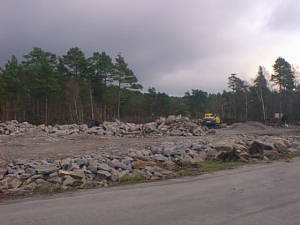Wednesday 6 December 2000

|
Pic of the day: Growth continues here in Norway. Here in the neighborhood, more than a dozen new houses are about to be raised. Now perhaps more of the world is heading for growth too ... Developing countriesYesss! Woo hoo! The World Bank reports that developing countries are finally actually developing! As in, economic growth. While there is much more to life than economic growth, it sure comes in handy when you're dirt poor and pickled in debt. This, my friends, could be the dawn of a new era in human history! During most of our lifetime, the standards of living in the developing world have slowly improved. At the same time, the industrial and (now) post-industrial world has gradually increased its distance to the poorer countries, reaching a level of affluence that would be astounding had we not grown used to it so gradually. Now the gap may actually start to close. The main problem that remain is the tariffs in rich countries. While goods typical of other industrialized countries have low or no taxes, the tariffs for clothes are quite high, and for food extreme: Sometimes over 100%! For the poorest countries, the trade barriers are formidable. They are unable yet to compete in other industries where tariffs are low. For each dollar they receive in foreign aid, they lose two in tariffs. Think of that, next time someone complains about the durned niggahs living off our money. ***But overall, the press release from the World Bank was quite cheerful reading. I found myself grinning broadly. Remember these people are tried and tested capitalists; their criticism of western trade barriers is very mild and dutifully balanced with the need for further liberalization on the side of the developing countries. But I think we may really be on the verge of something unimaginably big here. If we manage to kick start the third world economy in time before the coming downturn here in the west, it may even survive under our lean years, and represent a market for the next expansion. What we need, basically, is for the developing countries to reach a level where they can successfully trade with each other. There are products that we simply cannot produce at competitive prices. By trading with each other, the developing countries will be able to get these products at a reasonable price, and build their own societies at a lower cost. Now let us keep in mind that just because two countries are poor, they need not particularly like each other. And even if they do, they usually still lack the broad base of contact that the rich countries have with each other, with travellers flying back and forth regularly and with companies having branches or allies all over the world. To even know where you can find your customers or subcontractors is expensive when you live in a nearly pre-industrial society. So far, Internet penetration in developing countries has been rather small. This is one critical factor - with better communications between the countries, it would become far more feasible for them to trade with one another. I don't think we should worry if they do that. Not for a long while. When they earn half as much as we, we may start to reconsider our strategy. But well before that, I think we will have a natural flow of commerce with them that is quite richer than we have today. ***Why am I so excited over this? Why do I think about it at all? And I don't just think, I feel. The sensation of reading the World Bank's press release was one of almost physical pleasure, like being stroked by an invisible hand.[1] Well, it's my planet. I may seem self-absorbed at times, but I do care for mankind. Even though I have not yet been elected life time emperor of the world, I still take a keen interest in its affairs. Like it or not, it is my home for the duration of this lifetime. And it is teeming with people almost like me. They may be a bit dim, most of them, but I feel that they are definitely on the right track. A few thousand or even a few hundred years, and most of humanity may be as advanced as I am today. Now wouldn't that be wonderful? :) But we can't get there if we leave most of mankind to rot in the dirt. There's plenty of money here in the west now that people can afford the knowledge and the spare time to think about life, the universe and everything. Now if we could get the rest of the world above the daily battle for bread too, what couldn't the world see? Imagine all that human potential unleashed. The art, the creativity, the philosophy. A world of truth and beauty. [1] "The invisible hand" is one of the most famous expressions in economy, dating at least back to Adam Smith himself, referring to the mysterious force that makes market so efficient despite no single intelligence ruling them. (Actually I think Smith never used it this way, he just happened to both a: use the expression "invisible hand" and b: describe the efficiency of markets.) |
Yesterday <-- This month --> Tomorrow?
One year ago
Two years ago